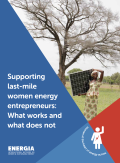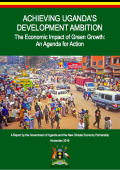This report from the UN Environment lists 8 different success stories from across the globe on the implementation of the green economy. The report covers: renewable energy in China; feed-in tariffs in Kenya, organic agriculture in Uganda; sustainable urban planning in Brazil; rural ecological infrastructure in India; forest management in Nepal; ecosystem services in Ecuador; and solar energy in Tunisia.
- Renewable Energy in China: The outline of 11th Five-year Plan (2006-2010) allocated a significant share of investments to green sectors, with an emphasis on renewable energy and energy efficiency. The Plan projects that the per-unit GDP energy consumption by 2010 should have decreased by 20 per cent compared to 2005. In addition, the Chinese government has committed itself to producing 16 per cent of its primary energy from renewable sources by 2020.
- Feed-In Tariffs in Kenya: In March 2008, Kenya’s Ministry of Energy adopted a Feed-in Tariff, based on the realization that “Renewable Energy Sources (RES) including solar, wind, small-hydro, biogas and municipal waste energy have potential for income and employment generation, over and above contributing to the supply and diversification of electricity generation sources”
- Organic Argriculture in Uganda: Uganda has taken important steps in transforming conventional agricultural production into an organic farming system, with significant benefits for its economy, society and the environment. The world's lowest usage of artificial fertilizers has been harnessed as a real opportunity to pursue organic forms of agricultural production, a policy direction widely embraced by Uganda.
- Sustainable Urban Planning in Brazil: The city of Curitiba, capital of Parana State in Brazil has successfully addressed urban challenges caused by increasing populations by implementing innovative systems over the last decades that have inspired other cities in Brazil, and beyond. Particularly known for its Bus Rapid Transit system, Curitiba also provides an example of integrated urban and industrial planning that enabled the location of new industries and the creation of jobs.
- Rural Ecological Infrastructure in India: India’s National Rural Employment Guarantee Act 2005 (NREGA) is a guaranteed wage employment programme that enhances the livelihood security of marginalized households in rural areas. Implemented by the Ministry of Rural Development, NREGA directly touches the lives of the poor, promotes inclusive growth, and also contributes to the restoration and maintenance of ecological infrastructure.
- Forest Management in Nepal: Community forestry occupies a central place in forest management in Nepal. In this approach, local users organized as Community Forest User Groups (CFUGs) take the lead and manage resources, while the government plays the role of supporter or facilitator. Forest management is a community effort and entails little financial or other involvement on the part of the government.
- Ecosystem services in Ecuador: The Fund for the Protection of Water – FONAG – was established in 2000 by the Quito municipal government, together with a non-governmental organization, as a trust fund to which water users in Quito contribute. FONAG uses the proceeds to finance critical ecosystem services, including land acquisition for key hydrological functions.
- Solar Energy in Tunisia: Tunisia created a funding mechanism – the National Fund for Energy Management – to support increased capacity in renewable energy technologies and also improved energy efficiency. The replenishment of this Fund is based on a duty levied on the first registration of private, petrol-powered and diesel powered cars and on import duty or local production duty of air-conditioning equipments with the exclusion of those produced for exports.



